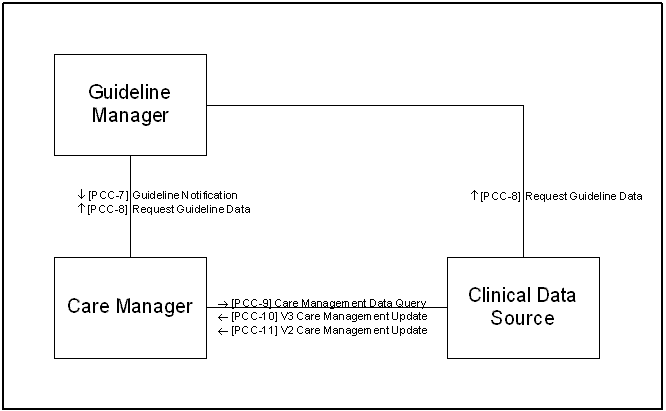Difference between revisions of "Care Management Profile"
| Line 16: | Line 16: | ||
These systems often include decision support capabilities, using evidence-based guidelines for the treatment and care of patients. They often use ad-hoc data gathering to collect information from many different sources to populate data repositories, which are then used to support and manage care for different patient populations. Information is provided to these systems from a number of sources. This profile helps to define the standards to ensure data flow to between these systems. | These systems often include decision support capabilities, using evidence-based guidelines for the treatment and care of patients. They often use ad-hoc data gathering to collect information from many different sources to populate data repositories, which are then used to support and manage care for different patient populations. Information is provided to these systems from a number of sources. This profile helps to define the standards to ensure data flow to between these systems. | ||
| − | == | + | == Referenced Standards == |
| + | {| | ||
| + | {{Std|CareRecord}} | ||
| + | {{Std|HL7QI|HL7 Version 3 Standard: Infrastructure Management – Query Infrastrucure|http://www.hl7.org/v3ballot/html/domains/uvqi/uvqi.htm}} | ||
| + | {{Std|HL7WS}} | ||
| + | {{Std|SOAP}} | ||
| + | {{Std|SOAP12}} | ||
| + | |} | ||
| + | |||
Revision as of 15:16, 9 October 2008
The Care Management Profile provides a mechanism for EHR and other HIT systems to communicate information to Care Management systems in support of specialized care programs through the use of evidence based guidelines.
Summary
The Care Management Profile (CM) supports the exchange of information between HIT systems and applications used to manage care for specific conditions. Examples of these systems include Cancer Registries, Chronic Disease Management Systems, Disease Registries and Immunization Information Systems.
Benefits
The collection of this data from health care IT applications can improve outcomes by supporting health management, substantially reducing health care costs. More and more, special purpose care management systems are used to support wellness programs, public health monitoring including tracking immunizations and infectious diseases, and to manage the care of patients with chronic diseases such as diabetes and cancer.
These systems often include decision support capabilities, using evidence-based guidelines for the treatment and care of patients. They often use ad-hoc data gathering to collect information from many different sources to populate data repositories, which are then used to support and manage care for different patient populations. Information is provided to these systems from a number of sources. This profile helps to define the standards to ensure data flow to between these systems.
Referenced Standards
Systems Affected
- Physician Office EMR's
- Hospital Information Systems
- Imaging Centers
- Laboratory Information Systems
- Insurance Provider Systems
Actors
Transactions
| Actor | Transaction | Opt. | Section |
|---|---|---|---|
| Guideline Manager | Guideline Notification | R | PCC-7 |
| Request Guideline Data | R | PCC-8 | |
| Care Manager | Guideline Notification | O | PCC-7 |
| Request Guideline Data | O | PCC-8 | |
| Care Management Data Query | R | PCC-9 | |
| V3 Care Management Update | R | PCC-10 | |
| V2 Care Management Update | R | PCC-11 | |
| Clinical Data Source | Request Guideline Data | O | PCC-8 |
| Care Management Data Query | CSee note 2 | PCC-9 | |
| V3 Care Management Update | C See note 1 | PCC-10 | |
| V2 Care Management Update | C See note 1 | PCC-11 |
- Note 1
- At least one of these transactions must be supported.
- Note 2
- A Clinical Data source that implements the Care Record option shall implement this transaction.
Status
Profile Status: Trial Implementation
See Also
The Patient Care Coordination Framework is the official master document for this Profile.
The Medical Summaries FAQ answers typical questions about what the Profile does.
The Medical Summaries Purchasing describes considerations when purchasing equipment to deploy this Profile.
The Medical Summaries Implementation provides additional information about implementing this Profile in software.
This page is based on the Profile Template
